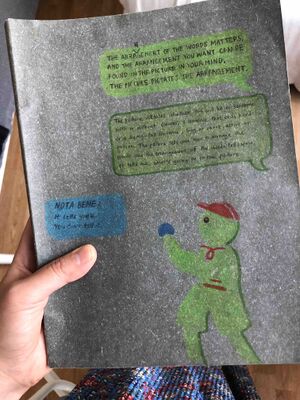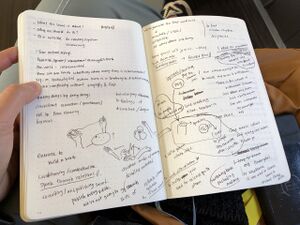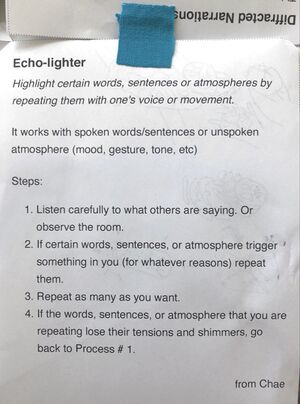SI 18 - Radio Implicancies - Chae's research log
Shortcut / Final Project
Classes
week 1
What is Radio Implicacy about?
Radio Implicancies is about practicing interdependencies. About how to stay with the complex entanglements between the personal, the economical, the political and the computational. About thinking, using and making technology with mutual relations in mind.
If everything is mixed up with everything else, where do you start? Does it ever end? What does it mean to mean to say “stop” or “cut”? And how could anything change?
Radio Implicancies invites you to experiment with practical and theoretical propositions by feminist, non-binary, queer, anti-colonial and other disobedient researchers/practitioners (people who do not stay in their own corners) who each in their own way tug at the threads of techno-ecologies. They crack jokes and demand the impossible but also pay attention to feelings of discomfort and despair. From and with them we learn about things like refusal, diffraction (Karen Barad) and figuration (Povinelli, Haraway) and about the openings these might make for imagining technology otherwise.
T. Trying to speak through relations and dependencies, instead of the language of ownership and saying who you are and what you have.
Imagine you are cutting a cucumber, after a while, there are little droplets forming on the cucumber, you take a picture. Now you are walking the streets of Segovia, there is a market. You see a pumpkin cut in half. And again, you see water droplets on the surface. You take a picture. You smile. Now, you are on the street of the Canal in Den Haag, and there are sparkles on the water and you don't take a picture (But I did take a picture haha :P) and really appreciate the moment. I'm here now because I know that these are things that are appreciated here.
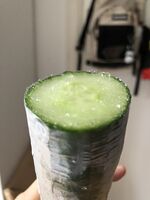
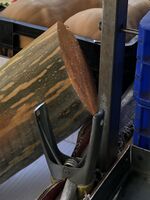
Notes: It was very interesting to observe how we choose/use words without thinking. (the word... 'my', 'have', etc) Although it was hard to catch different nuisance of different words. Active listening was 10 times harder than saying it without using the word 'my'.
Well! I got COVID!
Writing practice
With Kimberley, pad: https://pad.xpub.nl/p/writing-and-writing-and-writing
A Cabinet for Interesting Stuffs
week 2
https://slab.org/2018/02/13/feedforward/ Delia Darbyshire: https://www.youtube.com/watch?v=n2dvGQ32q8g] https://www.cafeoto.co.uk/shop/anthony-braxton-12-comp-zim-2017/
This ‘enabling the possibility of production by others' is often continued beyond the performance not only in the use of FLOSS-style distribution, but also in the conscious use of workshops as a means of presenting works and teaching the skills used in their creation. This pedagogic aspect extends to the prominence given to technical meetings and development workshops in artist-run festivals such as Piksel and MAKEART, or groups such as Dorkbot and OpenLab, and into the creation of dissemination platforms and projects such as pure:dyne and FLOSS Manuals. from pad: https://pad.xpub.nl/p/Problemsofnotation-for_annotation
Hacklabs & Hackmeets [please make links for this section as we read:] Hacklabs are voluntarily run spaces providing free public access to computers and the internet. They generally make use of reclaimed and recycled machines running GNU/Linux https://it.wikipedia.org/wiki/GNU and, alongside providing computer access, most hacklabs run workshops in a range of topics from basic computer use and installing GNU/Linux software, to programming, electronics, and independent (or pirate) radio broadcast. The first hacklabs developed in Europe, often coming out of the traditions of squatted social centres and community media labs. In Italy they have been connected with the autonomist social centres, and in Spain, Germany, and the Netherlands with anarchist squatting movements. Hackmeets are temporary gatherings of hackers and activists in which skills, tools and knowledge are exchanged and projects developed. Among the first hackmeets were those in Italy in the 1990s. There are direct connections between many of these and artists working with FLOSS. The dyne:bolic project (from which pure:dyne evolved) partly developed through the Italian hackmeets and Dutch hacklabs. RampArts hacklab in London http://london.openguides.org/wiki/?id=London_Hacklabs_Collective;oldid=London_Hacklab_Collective has provided a meeting point for the local OpenLab group, and in Barcelona, spaces such as Hackitectura and Riereta have supported several FLOSS-based art and political projects. Not all artists working with FLOSS and livecoding necessarily share the politics of the hacklabs scene, nor do all hacklab participants necessarily look upon their own activities as art-related, and some are, sometimes rightly, sceptical of artistic involvement in what they do. Hacklabs, however, have been absolutely fundamental to the development of FLOSS in recent years, especially in Europe and South America, and have provided a clear political and ethical orientation in contrast to the somewhat confused and often contradictory political and social perspectives articulated in the other communities and contexts of the wider FLOSS world.
If livecoding is one of the most emblematic artistic manifestations of FLOSS, hacklabs have become one of its most emblematic social forms. While the two may not occupy identical trajectories, they nevertheless overlap and compliment one another in many significant ways. Central to this is their shared principle of ‘enabling the possibility of production by others'. This is an issue of distribution, not simply at the level of product, in the way a piece of software can be easily distributed for example, but at the level of practice. The practice itself is inherently distributive, for it integrates the distribution of knowledge on how to produce into that which it produces. While this allows for possibilities of collaborative production, it should be seen as distinct from collaboration in itself. For whereas a practice that is collaborative coheres the production of many under a single goal, thereby directing the disposition of their labour, a practice that is distributive enables the disposition of labour by others under their own direction. This is enabled in the output of production as notation, as code that not only creates a product, but enters into an active life beyond its initial implementation.
Just as FLOSS brings together two related, yet differing, ethics of software production (‘Free Software' and ‘Open Source'), we might describe this music as Free Open Form Performance (abbreviated as FOFP). ‘Free playing' was a term preferred by Coleman and other jazz musicians who rejected the use of the term ‘improvisation' on the grounds it was often applied to black music by white audiences to emphasise some innate intuitive musicality that denied the heritage of skills and formal traditions that the black musician drew upon.
https://tricentricfoundation.org/carl-testa-essay
Many of the scores in Nature Study Notes set up small scale ‘operating systems', simple organisational structures that enable other works to be produced within them. The notion of the performance as an operating system is one that ap have taken up in their ‘Life Coding' project. Adapting mechanisms from computer systems, the interaction of performers is dictated by ‘interrupt' signals connected to actions defined in look-up tables. In conventional computers, the interrupt mechanism enables signals from peripheral devices such as mice, keyboards or network cards to enter into the operating system. When an interrupt signal is received, the computer selects a response action by matching an identifier code for each signal against a look-up table of programmed routines known as ‘interrupt handlers'. In this way pressing keys on a keyboard or moving the mouse can change the course of events currently in action. The interrupt creates a vector between the internal operation of the central processing unit (CPU), the domain of notational operations, and the contingency of the outside world. As Edsger Dijkstra, one of the inventors of the interrupt system, noted:
It was a great invention, but also a Box of Pandora. Because the exact moments of the interrupts were unpredictable and outside our control, the interrupt mechanism turned the computer into a nondeterministic machine with a non-reproducible behaviour, and could we control such a beast?
Chamo_Notation Exercise
Worked with Kamo, we covered one annotation by Miri and Emma and made two original(?) track for ours. Two teams covered 'Notation system for 2 or + fingers'
chae@soupboat:~/shared/html/SI18/notations/chamo $ ffmpeg -i "Linzen Tefal express.m4a" -c:v copy -c:a libmp3lame -q:a 4 linzen-tefalexpress.mp3
- https://hub.xpub.nl/soupboat/~kamo/projects/notation-system/ (Kamo made a very nice documentation about the exercise)
A Cabinet for Interesting Stuffs
week 3
Terminal 101 / Pen Plotter
Prototyping class 정리해서 넣어둘것. 터미널에서 소통하는 방식
Critical and Intimate Evaluation of Crunchiness
Uneven Patterns
Crunch Search
A Cabinet for Interesting Stuffs
week 4 (May Holiday)
A lecture by Paul
Form as a way of inviting people and making a safer/better/welcoming place.
<form> was what I found interesting during the first project, ETC Portal to Contamination, I see a lot of potential.
By using the language of survey and form, but by making it more welcoming and cosy.. what can I do with it? What is the potential?
<form> tag as an intimate/welcoming space
projects for the Summer, collaborate with Kamo
Thinking of Speech-to-text
https://soundcloud.com/goodpoint/81-movies?utm_source=clipboard&utm_medium=text&utm_campaign=social_sharing
I once made an advertisement. The instruction is to read an ad copy originally written in Korean but transcribed in English and make non-Korean speakers read the text. Enjoy! (The ad starts from 49:13)
A Cabinet for Interesting Stuffs
week 5
prototyping, Speech-to-Text Instrument
Monday 9th May 2022
Ideas
1)
2)
Inspiration: https://vimeo.com/309578104
Museum Manners for Siri / Single Channel Video / 52s (2m42s original) / 2016 / Jisoo Chung
- https://freesound.org/docs/api/overview.html
- https://github.com/MTG/freesound-python
- https://github.com/goodatlas/zeroth
- https://github.com/alphacep/vosk-api/blob/master/python/example/test_words.py
- https://pypi.org/search/?q=speech&o= (how to search certain things in the library)
SI18 3rd Release, Emergent Opera
NOTE TO ME: CHECK EVERY PROJECT IN RADIO IMPLICANCIES ON SI WIKI PAGE an email review with Erica
Reading 'The plot of her undoing' together
Documents, refuse to use the slavery inventory. Chosing one's narrative. Fiction as an act of refusal, disobedient.
week 6
Jingle Board Parliament
I did not participate as a contributor for this release (Tuesday 17 May 2022), but I shared some notes during the class as an observer/listener.
Notes: (1) Feels like I am constantly changing the channels of a TV. Or is this more like an act of scrolling? is it more about one sending a message than listening and reacting to each other? => Jian and Miriam gave another remark that they had several moments of reacting to each other. => Then the question is the reactivity is highly related to the proximity? => How can the audience who are not in the moment / only listening to the recordings of the live event, can get this feeling then? (2) Echoing I noticed some strong inter-active moments and those were when someone is clicking the same clip. (3) When is the end? noticed that starting and playing the clip is very easy. But searching for the ending part was very tricky and super interesting. Finding the right(?) moment of ending. => What does it mean by finding the 'right' moment? When is the 'right' moment? Why finding a 'right' moment? (4) national anthem What kind of nation this parliament is based on?
Assignment for the Summer, in preparation for the next year
Chae's commission: compile a text from existing texts you have written rules
1) NO NEW TEXT (organise and edit existing texts) 2) make drawings, charts and diagram 3) Include images from other places.
word count: 2000 words Deadline beginning of next trimester.
Maybe use this as a guide:
What [100words]
How [100words]
Why [100words]
A Cabinet for Interesting Stuffs
week 7
Prototyping-arduino-microcontroller
Highlighting and deleting
In collaboration with Gersande.

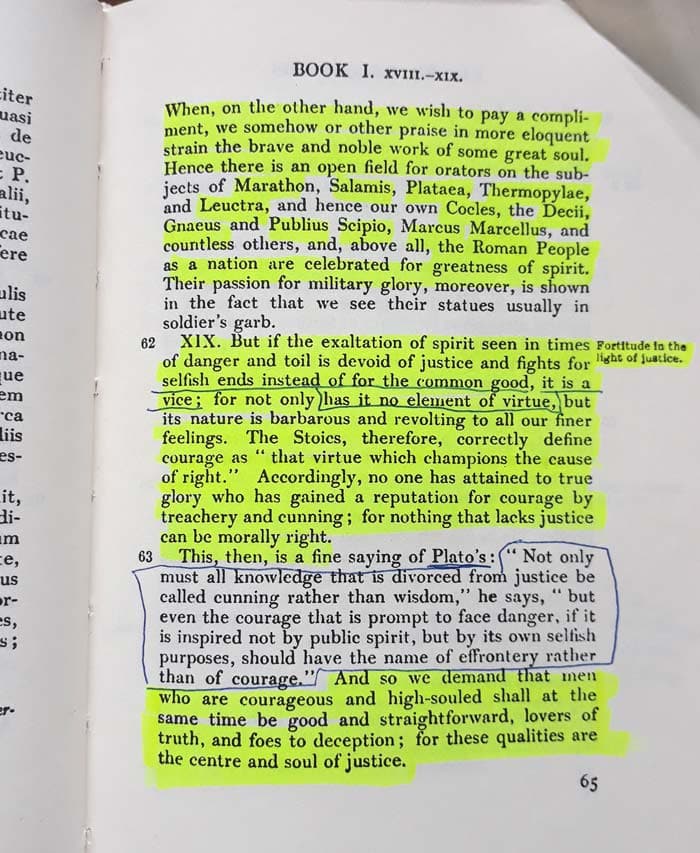

A Cabinet for Interesting Stuffs
- https://youtu.be/yb2vYuEFhaU (Food Hacking: Recipe Network)
"But the system is not perfect. It suggests ingredients but we have to figure out the cooking method. Human intelligence is good at creating methods. but thinking about millions of ingredients isn't possible for human creativity. So combining human and computer creativity is the best answer." [excerpts from the video]
(Yui Kita, Research interests: HCI / NLP / Machine Learning. Applying machine learning techniques to creative processes such as cooking, painting or playing instruments covering both practical issues on HCI and underlying theories of creativity.)
- https://youtu.be/yBd_l72pRkQ (Kunstinstitute Melly, PANEL: De-modernizing Visual Culture)
Amy Suo Wu's answer on mending and stegonography
- https://en.wikipedia.org/wiki/Steganography
- Minor Feelings by Kathy Park Hong
- 이수경 작가 Lee Sukyung - drawing as a main practice
week 8
Diffractive Cookbook
Method that I submitted.
Diffractive Reading
I transcribed and highlighted sentences from the following talk and readings:
—“Minor Feelings” by Cathy Park Hong
—“Mapping Beyond Dewey’s Boundaries: Constructing ClassificatorySpace for’ Marginalized Knowledge Domains” by HOPE A. OLSON
—SONIC ACTS FESTIVAL - THE NOISE OF BEING, Wendy Chun - Crisis + Habit = Update 25 February 2017 - De Brakke Grond, Amsterdam, The Netherlands
Each color represents the personal connections that I made between texts and feelings that I had during my experience living in Europe or texts with other texts.
I thought about the etc project (the ETC portal to contamination), uneasy feeling whenever I walk different cities in Europe.
File:Excuse-me-diffractive-reading.pdf
A Cabinet for Interesting Stuffs
week 9
[UNFOLDING [ ] IMPLICANCIES]
Invitation / invitee / inviter
A Cabinet for Interesting Stuffs
week 10
8ight
paris-le generale
A Cabinet for Interesting Stuffs
- https://lisamouchet.com/
- https://hackersanddesigners.nl/s/Events/p/%27Figuring_Things_Out_Together%27_%40TROEF_Leiden
- https://en.wikipedia.org/wiki/Pedagogy_of_the_Oppressed
- https://www.bdangouleme.com/selections-officielles-2021/album/28
Meetings
The first meeting coming up Sunday, for the documentation for SI18
Station Skills
Ceramic Station
More! More!
Build your own tempeh incubator
Fabric Station
Repair Cafe
Feltloom Instruction
Fri 22 Apr 2022, 10:30-12:00
Weaving
Mon 16 May 2022, 18:00-20:00
And so on
WeMen Workshop in Segovia
Flower Symphony, production
Future Ref.
A Refrigerator Magnet for Kim's Recipe Newsletter
Workshop @Varia, partylines.hold-and-release
Interesting Stuffs
- https://git.vvvvvvaria.org/decentral1se/mist-connections/
- https://en.wikipedia.org/wiki/The_Three-Body_Problem_(novel)
- https://hokkaikitchen.nl/
- https://en.wikipedia.org/wiki/Antilibrary#:~:text=An%20antilibrary%20is%20a%20collection,compared%20to%20the%20Japanese%20tsundoku.
- https://www.imdb.com/title/tt4185186/
- https://mlml.io/p/cold-storage/
- https://en.wikipedia.org/wiki/Internet_Archive
- https://en.wikipedia.org/wiki/Digital_hoarding

